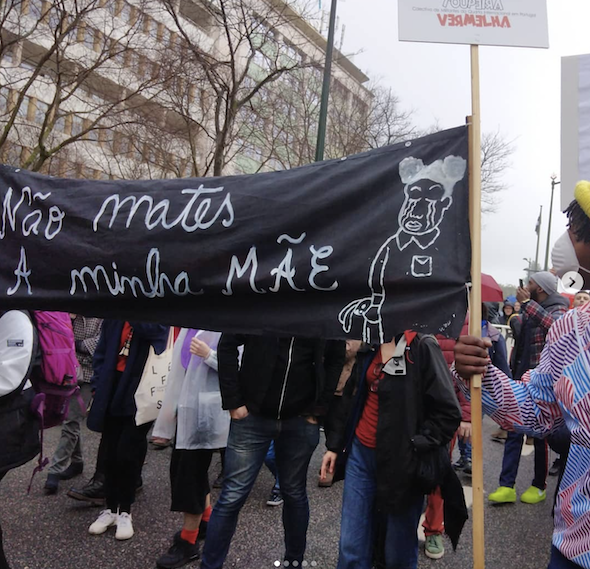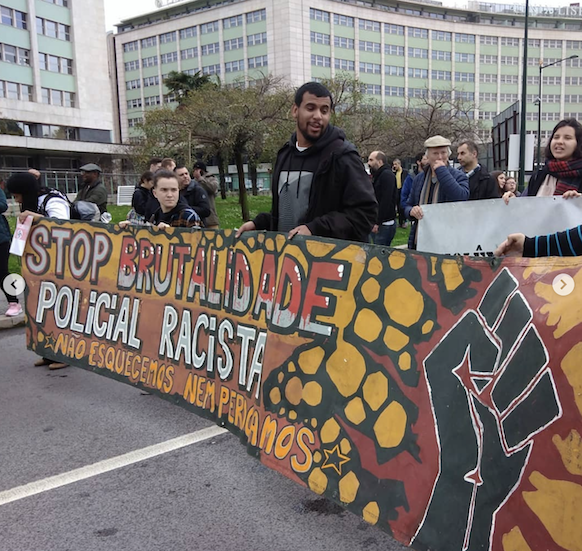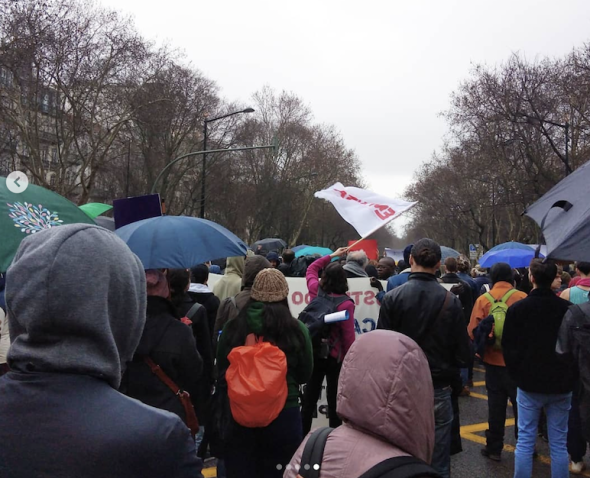“Don’t kill my mother!”
1. February 1st, 2020. Coming back from Alentejo, I arrive early to Marquês de Pombal, just like the police, which brought men, guns, and batons. For lunch I have bacalhau à lagareiro with hot olive oil and lots of garlic in a restaurant where, for more than 40 years, journalists from the Diário de Notícias, medium-caliber businesspeople, or the cream of the culture have eaten. The place is called “Nata do Marquês.” After the cod, I join the people in the roundabout, from where I appreciate, from below, the statue of the horse with a Marquis of Pombal known, among other achievements, for having abolished slavery, even though it wasn’t quite like that. Our equestrian scene, vertically symbolizing power, is the same as that of any other European city, just as power is the most perverse of exercises.
Hugs and small talk with the protesters, preliminaries that inhibit me, you can never say how much we admire the people we follow, more or less closely, firm in their positions and struggles. An INMUNE activist sells me a t-shirt that has “Justice for Cláudia Simões” written on it, a phrase that unfortunately has and will have several victims’ names. I receive a piece of paper with instructions in case we are attacked or arrested. We walked down the Avenue with hundreds of people shouting, «Rabble united will never be forgotten», or would it be «Rabble forgotten always united»?, «our fight is every day, against racism and xenophobia».
Cláudia Simões, another Black woman beaten, her face destroyed in a rear-naked choke (in Portuguese known as golpe de leão), in which the lion was PSP police officer Carlos Canha who attacked her in front of her desperate daughter, watching her mother’s despair. Listening to her mother scream: “He wants to pierce my eye.” Listening to the irascible policeman: “Bite, bite, bite,” “these people don’t know the laws” or “you’ll get hit with a bullet.” And the girl begging: “Don’t kill my mother!”
 Cláudia Simões Justice March 1/2/2020, photo by Marta Lança
Cláudia Simões Justice March 1/2/2020, photo by Marta Lança
Because she forgot a pass, her daughter’s, and children up to the age of twelve travel for free (how many times have I taken my daughter on transport without even taking the pass), Cláudia Simões was a victim of racial hatred and police violence.
Hovering along the avenue, one feels the strength and impotence of so many women like Cláudia Simões, who went through terrible trials, without support from the media, justice and the structures of a society that abandoned them. A strong but exhausted riot of shouting the same things, less spontaneous and emotional than that of Giovani or than, a year earlier, the triumphal ascent of the Avenue by so many indignant young Black people, with the anger of the images of the Jamaica neighborhood exploding within out of their heads.
2. At the end of the march, I walk down, in a hurry, to the boat to Cacilhas. Through the dirty windows of the boat, hints of light highlight the nature of the river’s passage. I know that anyone who crosses the Tejo every day will not have epiphanies of self-discovery, nor will it occur to them to admire the beauty of the river and the crossing, other than the great blindness of permanently feeling robbed of their lifetime, robbed of their own life. Feeling like it’s too late to get home and too early the next day. In the demand of so many hours squeezed into work, paid off on a salary that is barely enough to eat and, in so many cases, not enough to sleep under your own roof.
Ironically, that same afternoon we debated, at the Almada Municipal Theatre, the Austrian play «Winter Journey», by Elfriede Jelinek, about the situation in Europe. The girl who was trapped in a basement for eight years and who, upon freeing herself from her executioner, disturbed the world with her way of describing the horror that had happened to her, avoiding being the conventional “victim.” We establish parallels between the Austrian cellars and the Portuguese cellars, between denazification and colonial continuities and other issues.
 Cláudia Simões Justice March 1/2/2020, photo by Marta Lança
Cláudia Simões Justice March 1/2/2020, photo by Marta Lança
3. Almost 4 years later, the trial began, which we can follow, among others, through articles by Joana Gorjão Henriques in journal Público. Carlos Canha, the police officer, and Cláudia Simões, the worker, a bus passenger, are both offended and accused. The most important gesture is the fact that Cláudia Simões did not remain silent after all the tragedy that happened to her. There are many people who lose the courage to report and prosecute because they know that justice is not always on the side of the fragile, and because in cases involving police against racialized minorities, good news are rare (and long live the historic sentence in the case of the Alfragide police station, 2015).
Cláudia Simões, despite having her face completely disfigured, having been unable to work in the months following the attack, and her daughter being traumatized for the rest of her life, went ahead in denouncing her personal and collective barbarity, that of justice for the victims of racial violence, she and so many others before and after in the history of subhumanity. Despite the humiliation, of also being judged for having bitten the attacker, as if a reaction of defense and survival to someone who takes away her air could ever be an attack on the “physical integrity” of an armed professional… Despite the humiliation of reliving all that and sordid episodes such as having to take off her wig to show the judge the damage to her hair, which had been roughly pulled by the agent (“After Cláudia took off her wig, leaving a net visible over her head, the judge also asked her to to remove the net. Is there anyone out there who remembers human zoos?” asks journalist Paula Cardoso). Despite all this, it could be yet another fundamental trial in the history of anti-racism in Portugal, closely linked to police repression.
4. In 2014, I interviewed for Rede Angola, at her home, Maria Sala (Filó), an Angolan living in Portugal, who had just suffered a brutal and gratuitous attack by a police officer, with the grace of having her five-year-old son, watching the spectacle of the mother being beaten up and taken as a criminal. It took place in the Massamá/Barcarena Shopping Center where she owned a small restaurant-bar. It closed daily at 10pm, with a normal margin of 30 minutes for cleaning. Filó found herself inside the store at 10:15pm with a friend who helped her tidy up the house. The security guard on duty interceded, urging her to immediately close the restaurant to close down the Center, calling the police officer on duty to get rid of her.
 Cláudia Simões Justice March 1/2/2020, photo by Marta Lança
Cláudia Simões Justice March 1/2/2020, photo by Marta Lança
The police officer pushes her abruptly, and Filó instinctively tries to defend himself, tripping and giving the officer a small scratch. An impressive succession of violent attacks then follows, from electric shocks to kicks, until she is forcibly handcuffed by the police, in connivance with the security guard, to be detained. “Don’t kill my mother!,” again the cry of the innocent child, forever marked. Once in the car, the aggression and humiliation of the young woman continued without respite, with punches to the face and racist insults until the Massamá police station [in Quinta das Flores], where the beating continued, by the same officer. It lasted from 10:30 pm to 2:00 am. At 10 am the following day, Maria Sala had to present herself, still convalescent, at the Sintra Court, as the police accused her of contempt of authority. The trial, which was supposed to be summary, was postponed, became an Inquiry and the Court was going to find out what happened. Meanwhile, Maria Sala also gained courage and filed a complaint against the agent, and, at the time we spoke, she was waiting for him to be notified. He had the help of a lawyer assigned by social security. I don’t know the outcome of this story.
We have great hope that the case of Cláudia Simões will be able to do justice, real and symbolic, to so many attacks and impunity, to this abuse of power, to this racial, sexist hatred - of a colonial nature - that still lives in so many, in these cases, Portuguese Policemen, brutalized by a culture that has not yet known how to teach them to get rid of their most primal prejudices.
Addendum: May 2024
In the final arguments of the trial, in the Sintra court, the Public Ministry prosecutor asked for the acquittal of police officers Carlos Canha, João Gouveia and Fernando Rodrigues, condemning the behavior of Cláudia Simões (also accused in this case) for disobeying the order of agent Carlos Canha to identify himself and for, at trial, appearing arrogant and showing “exaggeration” in his comments about what happened.
And thus the inequality of justice in relation to women and, above all, black women is perpetuated.